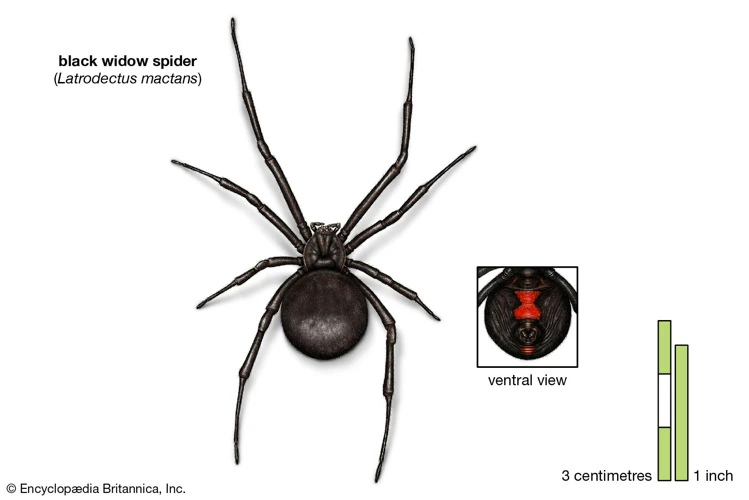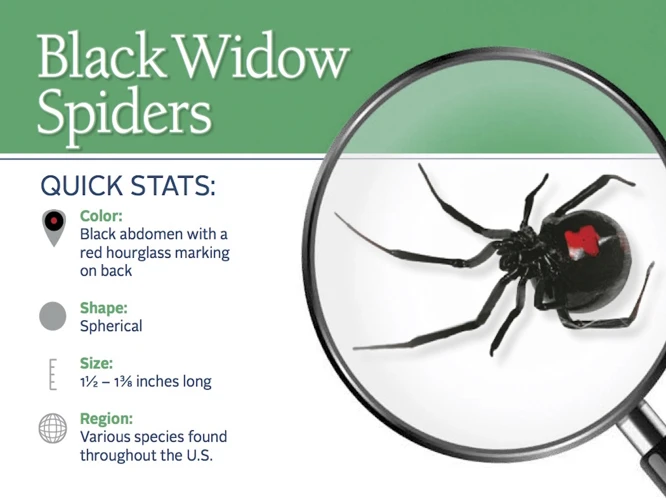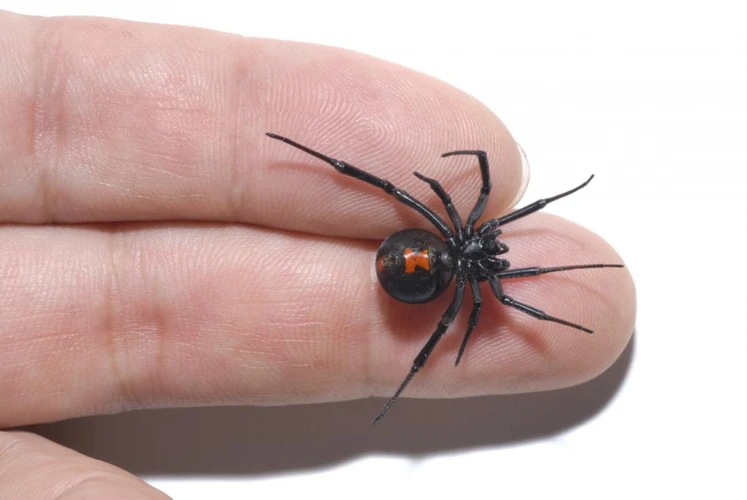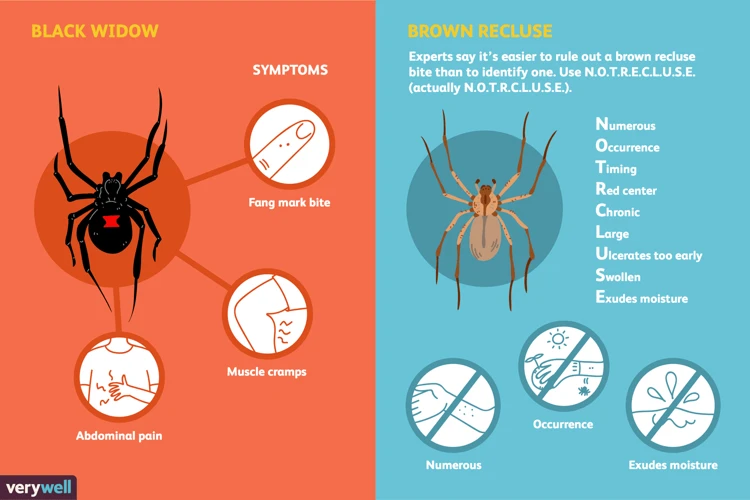Introduction

For those who love exploring the great outdoors, encountering a black widow spider can be a frightening experience. These venomous spiders are found in various parts of the world, and their bites can cause serious health complications. In this informative guide, we will take a closer look at the symptoms and treatment options for black widow spider bites to help you stay informed and prepare for unexpected encounters. Let’s dive into the world of black widow spiders and learn more about their potentially dangerous bites.
Overview of Black Widow Spiders
Black widow spiders, scientifically known as Lactrodectus mactans, belong to the family Theridiidae and are known for their dangerous bite. These spiders are typically black with a distinct red hourglass shape on their abdomen. Female black widow spiders are larger than males and are often responsible for bites.
Black widow spiders are found throughout the United States, particularly in warmer climates. They prefer dry, dark places such as woodpiles, garages, and sheds, but can also be found in more urban areas. Despite their reputation for being aggressive, black widow spiders will typically only bite when they feel threatened.
There are many myths surrounding black widow spiders, including the idea that they are aggressive hunters and can grow to an enormous size. However, these myths have been debunked. To learn more about the facts and fictions surrounding black widow spiders, check out our article on Black Widows: Fact or Fiction?.
Prevalence of Bites
According to the American Association of Poison Control Centers, there were approximately 2,800 reported cases of Black Widow spider bites in the United States in 2020. However, the true prevalence of Black Widow spider bites is likely higher, as many bites may go unreported or misdiagnosed.
Black Widow spiders are found throughout the United States, with the highest concentration of bites occurring in the southern regions. These spiders tend to live in dark, damp habitats, such as sheds, garages, and woodpiles.
While Black Widow spider bites are not usually fatal, they can cause significant discomfort, pain, and even long-term health consequences if left untreated. It is important to seek medical attention immediately if you suspect you have been bitten by a Black Widow spider.
Contrary to popular myth, female Black Widow spiders do not typically eat their mates after mating. While mating can be a risky activity for male spiders, as they may become a potential meal for the female, this behavior is not typical for the overall population.
To protect pets from Black Widow spider bites, it is important to keep them away from potential habitats and to ensure they are not left alone outside for extended periods. Be sure to check their bedding and outdoor play areas for signs of spiders.
By debunking common myths and learning the truth about Black Widow spiders and their venom, you can take the necessary precautions to avoid bites and seek appropriate treatment if needed.
Identifying Black Widow Spider Bites

While black widow spider bites are rare, they can cause severe symptoms and require immediate attention. It’s important to be able to identify a black widow spider bite so that you can seek treatment as soon as possible. In this section of the article, we will go over the key identifiers of a black widow spider bite, including the physical appearance of the bite, the symptoms that accompany it and their severity. Let’s dive in and learn how to recognize a black widow spider bite.
Appearance of Bite
When it comes to identifying a black widow spider bite, the appearance of the bite itself can vary. The bite may appear as two small puncture wounds, or a red swollen area with a noticeable lump or blister. In some cases, there may be no visible bite mark at all.
It’s important to note that the color of the area around the bite can also provide some clues as to the severity of the bite. A milder bite may cause redness and swelling, while a more severe bite may cause a purple or blue discoloration around the bite mark.
It’s important to keep an eye out for any symptoms that may appear in the hours or days following the bite. As mentioned earlier, black widow spider bites can be extremely dangerous and potentially fatal if left untreated, so it’s crucial to seek medical attention if you suspect you or someone else has been bitten.
If you suspect you have been bitten by a black widow spider, it’s important to refer to the physical symptoms which may include muscle pain, spasms, abdominal pain, and sweating. If these symptoms appear, seek immediate medical attention.
Fun Fact: Despite popular myths and misconceptions, black widow spiders do not always have a red hourglass on their abdomen. This marking is only present on females, and is not exclusive to all female black widows.
For more information on black widow spider bites, including how to prevent them and how to treat them, check out the following article – Top Black Widow Myths Debunked.
Physical Symptoms
Physical Symptoms:
After being bitten by a black widow spider, the following physical symptoms may occur:
- Pain at the site of the bite: The bite of a black widow spider can be very painful, similar to a pinprick. The pain usually develops within an hour of the bite.
- Redness and swelling: The area around the bite may become red and swollen, spreading out from the bite location.
- Muscle cramps: Muscle cramps are the most common symptom of a black widow spider bite, and usually begin within 2-3 hours of the bite, and can spread to other parts of the body.
- Stomach cramps: Abdominal cramping and pain can also occur, along with nausea and vomiting.
- Sweating: Excessive sweating, particularly around the site of the bite, is another common symptom.
- Headache: Some people may experience a headache after being bitten by a black widow spider.
- Numbness or tingling: Numbness or tingling in the affected area, as well as in other parts of the body, are symptoms that can occur several hours after the bite.
- Difficulty breathing: In rare cases, bites from black widow spiders can cause difficulty breathing, although this is usually only seen in young children, the elderly, or those with weakened immune systems.
If you experience any of these symptoms after being bitten by a black widow spider, seek medical attention immediately. It is important to note that while the symptoms listed above are common, some people may not experience any symptoms at all. In rare cases, severe reactions such as seizures or death can occur, but these are very uncommon.
Remember, although black widow spiders are venomous, they are not usually aggressive towards humans and will only bite if they feel threatened. By taking steps to eliminate spider habitats and taking safety precautions when working outdoors, you can help prevent black widow spider bites. To learn more about common myths and misconceptions regarding black widow spiders, check out our article on /myth-black-widows-clusters-debunked/.
Severity of Symptoms
When it comes to black widow spider bites, the severity of the symptoms can vary from person to person. While some individuals may experience only mild symptoms, others can face severe or even life-threatening reactions. The severity of the symptoms can depend on several factors, such as the amount of venom injected, the individual’s age, weight, and overall health.
In some cases, the bite may be painless at first but can lead to symptoms such as stiffness, muscle cramps, and spasms within hours. These muscle cramps can be excruciatingly painful, and many individuals describe them as feeling like a “charley horse” in the affected area. Other common symptoms of a black widow spider bite include sweating, nausea, vomiting, and headaches.
In rare cases, a black widow spider bite can lead to more severe symptoms, such as seizures, high blood pressure, and difficulty breathing. These more severe symptoms are more common in children, the elderly or those with weakened immune systems.
It’s worth noting that not all bites from a supposed black widow spider will actually contain venom. Some spiders may deliver a “dry bite” that doesn’t contain any venom at all, resulting in little to no symptoms. However, it’s important to take all black widow spider bites seriously, as the risk of a severe reaction is always present.
If you suspect you have been bitten by a black widow spider and are experiencing any of these symptoms, seek medical attention immediately. Despite the severity of the symptoms, black widow spider bites can be treated with the right care and attention. It’s always best to err on the side of caution and seek help from a medical professional if you’re unsure about the severity of your symptoms.
(Internal link: /truth-black-widow-venom/)
Treatment for Black Widow Spider Bites

Treating a black widow spider bite is crucial and should be done as quickly as possible to prevent any complications from arising. Black widow venom can affect the nervous system in a way that can cause severe symptoms, so it’s essential to seek medical attention if you suspect you or someone else has been bitten. In this section, we’ll discuss first aid measures you should take, medical treatments, and antivenom that can help counteract the toxic effects of black widow spider bites.
First Aid
After being bitten by a black widow spider, immediate first aid can help reduce the severity of symptoms. The first step is to seek medical attention as soon as possible. While waiting for medical help, however, there are a few first aid steps that can be taken.
The following table summarizes the first aid steps to take in the event of a black widow spider bite:
| Step | Description |
|---|---|
| 1 | Wash the bite area with soap and water. |
| 2 | Apply a cold compress to the bite area for 10 minutes at a time. |
| 3 | Keep the affected limb elevated to reduce swelling. |
| 4 | Take over-the-counter pain medication, such as acetaminophen or ibuprofen, to relieve pain. |
| 5 | Do NOT apply a tourniquet or try to suck the venom out of the bite wound. |
| 6 | Do NOT consume alcohol or caffeine, as these can speed up the effects of the venom. |
| 7 | If possible, capture the spider for identification purposes. |
It is important to note that while first aid can help alleviate some symptoms, it does not replace medical treatment. Seeking medical attention is crucial after being bitten by a black widow spider. If you suspect that you have been bitten by a black widow spider, don’t hesitate to seek medical help immediately.
If you want to learn more about other myths and misconceptions related to the black widow spider, check out our article on myths surrounding giant black widow spiders.
Medical Treatment
Medical treatment for a black widow spider bite should always be sought as soon as possible. While some cases may require only basic first aid, others may require more advanced interventions. Here are some of the possible medical treatments for a black widow spider bite:
| Treatment | Description |
|---|---|
| Pain Management | If pain is the main symptom, it can be managed with over-the-counter pain relievers such as ibuprofen or acetaminophen. However, stronger pain medication may be prescribed in severe cases. |
| Muscle Relaxants | Black widow venom can cause muscle spasms and cramps. In such cases, muscle relaxants can help alleviate the symptoms. |
| Antivenom | In severe cases, antivenom may be necessary to counteract the effects of the venom. Antivenom is a serum made from the antibodies of animals that have been exposed to black widow venom. It can be given intravenously and has been shown to be effective in reducing the severity of symptoms. |
| Tetanus Shot | Black widow spider bites can introduce bacteria into the bloodstream. As a precaution, a tetanus shot may be given to prevent tetanus, a serious bacterial infection. |
It is important to note that not all patients will necessarily need all of the treatments listed above. Treatment plans will depend on the severity of the bite and the specific symptoms experienced by the patient. Nonetheless, if you suspect you have been bitten by a black widow spider, seeking medical attention should be your top priority.
Interested in learning more about black widow spiders? Check out our article on black widow spider myths and realities.
Antivenom
Antivenom is the most effective treatment for severe black widow spider bites. Antivenom is a medication that neutralizes the venom from the black widow spider bite. It is usually given intravenously in a hospital setting. The antivenom is made from purified antibodies from horses that have been exposed to black widow spider venom. The antibodies are collected, purified, and processed into antivenom.
Antivenom should only be used in severe cases of spider bites, as there are potential side effects to its use. These side effects can range from minor reactions like rash and itching to more severe reactions such as difficulty breathing and anaphylaxis. It is essential to always be supervised by medical professionals while receiving antivenom.
According to the National Institutes of Health (NIH), antivenom is most effective if given early, within a few hours of the spider bite. Even if the spider bite does not seem severe initially, it is important to seek medical attention immediately if any symptoms appear.
It is important to note that antivenom is not always available in all hospitals. If you are living or traveling to an area where black widow spiders are prevalent, it is essential to know which local hospitals have it. Additionally, it is important to take measures to prevent spider bites, as antivenom should only be used in severe cases.
Here is a summary of key points about antivenom in a table format:
| What is Antivenom? | Medication that neutralizes venom from black widow spider bite |
| How is Antivenom Given? | Intravenously in a hospital setting |
| How is Antivenom Made? | Purified antibodies from horses exposed to black widow spider venom |
| Side Effects of Antivenom? | Range from minor reactions like rash and itching to severe reactions such as difficulty breathing and anaphylaxis |
| When is Antivenom Most Effective? | If given early, within a few hours of the spider bite |
| Where is Antivenom Available? | Not available in all hospitals, know which local hospitals have it |
Remember, antivenom is not always necessary for treating black widow spider bites. It is important to assess the severity of the bite and to seek medical attention immediately if any symptoms appear. By taking preventative measures and avoiding spider habitats, you can reduce the risk of being bitten by a black widow spider. For more information on how to protect yourself and your pets from black widow spider bites, check out our article on protecting your pets from black widow spiders.
Preventing Black Widow Spider Bites
When it comes to preventing black widow spider bites, it’s important to take certain precautions to avoid contact with these venomous arachnids. While black widows are not known to be aggressive and typically only bite when they feel threatened, it’s still crucial to limit your exposure to them. In this section, we will explore some effective strategies you can use to reduce your risk of getting bitten by a black widow. Keep reading to learn more about how to protect yourself from this potentially dangerous spider.
Eliminating Spider Habitats
Eliminating spider habitats is one of the most important ways to prevent black widow spider bites. Black widows prefer dry, secluded areas to build their webs for hunting. They can be found in crevices, under piles of wood or rocks, and in dark corners of garages or sheds. Here are some effective ways to eliminate spider habitats and minimize the risk of a black widow bite:
- Clean and declutter: Black widows love to hide in cluttered areas, so it’s important to keep your living spaces neat and tidy. Regularly clean up piles of debris, unused boxes, and other items that provide hiding places for spiders.
- Seal up holes and cracks: Spiders can enter your home through tiny openings around windows, doors, and vents. Use caulk or weather stripping to seal up any gaps that are larger than a quarter inch.
- Remove webs: Regularly sweep away spider webs from the corners of your home, especially those in dark or damp areas like basements and attics.
- Use essential oils: Certain fragrances can repel spiders. Peppermint and citronella oils are effective in keeping black widows away. You can place cotton balls soaked in these oils around your home to deter spiders.
- Keep the yard clean: Black widows can also be found in yards. Keep bushes and trees trimmed, and remove any piles of leaves or debris. Also, consider using yellow outdoor lighting, as it is less attractive to insects, which in turn, means fewer spiders will be around.
By taking these steps to eliminate spider habitats, you can significantly reduce your chances of being bitten by a black widow spider. However, if you do happen to encounter one, it’s important to know how to identify and treat the bite. See our article on the black widow’s red hourglass or learn more about black widows with black widow spider hunting and feeding myths and realities.
Taking Safety Precautions
It’s essential to take some precautions to avoid getting bitten by a black widow spider. These spiders usually dwell in outdoor areas such as sheds, woodpiles, garages, and cluttered areas. However, they can also make their way into homes through cracks and gaps in walls or windows. It’s crucial to take safety measures to prevent black widow spiders from entering your living space.
Here is a table that includes practical safety precautions that you can follow to keep black widow spiders away from your home:
| Precaution | Description |
| Seal all points of entry: | Ensure that all cracks, gaps, and crevices in walls, windows, and foundations of your home are sealed to keep spiders out. |
| Install screens: | Place screens on windows and doors to stop spiders from entering your home. |
| Declutter: | Keep your surroundings organized and free of clutter, particularly in places you don’t often go, such as basements and attics. |
| Wear long sleeve clothing: | When working outside, it’s advisable to wear long-sleeved shirts and pants to minimize the chances of a spider bite. |
| Protect your hands: | Always wear gloves when handling items that have been outside or have been stored for a long time, such as boxes, firewood, and gardening tools. |
| Keep it clean: | Regular cleaning of your home, especially in hard-to-reach areas like attics, crawl spaces, and basements, reduces the likelihood of black widow spiders making their home in your home. |
By taking these simple precautions, you can greatly reduce the likelihood of black widow spiders entering your home and minimize the chances of getting bitten. Remember that prevention is key to reducing the risk of a bite from a black widow spider.
Conclusion
As we conclude our discussion on black widow spider bites, it is important to remember that prevention is key when it comes to these potentially dangerous encounters. By taking the necessary precautions and knowing how to identify and treat a bite, you can avoid a potentially harmful situation. With that said, let’s recap some of the key takeaways from our discussion.
Final Thoughts
While black widow spider bites can be extremely painful and potentially dangerous, they can be treated effectively if immediate action is taken. Remember that prevention is key and taking necessary precautions such as eliminating spider habitats and wearing protective clothing can go a long way in avoiding bites in the first place.
Here are some final thoughts to keep in mind:
- Be familiar with the appearance of black widow spiders and their habitats in your area.
- Always wear protective clothing when working outdoors in areas where black widows are commonly found.
- If you suspect that you have been bitten by a black widow spider, seek medical attention immediately.
- Do not wait for symptoms to appear before seeking treatment.
- Remember that prompt treatment can make a big difference in the severity and duration of symptoms.
- Stay calm and try to keep the affected limb elevated to slow down the spread of venom.
- Lastly, be mindful of your surroundings and take necessary precautions to protect yourself and your loved ones from potentially harmful spider bites.
By being informed about the symptoms and treatments for black widow spider bites, and taking steps to prevent bites from occurring, you can reduce your risk of being bitten and stay safe and healthy.
Frequently Asked Questions
What does a black widow spider look like?
A black widow spider is typically black with a shiny appearance and a distinctive red hourglass-shaped marking on its abdomen.
How do black widow spider bites happen?
Black widow spider bites typically occur when humans accidentally come into contact with the spider, whether it be through disturbing its habitat or unintentionally touching it.
What are the symptoms of a black widow spider bite?
Common symptoms of a black widow spider bite include severe muscle pain, cramping, nausea, vomiting, and sweating.
Are black widow spider bites fatal?
While black widow spider bites are not usually fatal, they can be especially dangerous for young children, the elderly, and those with weakened immune systems.
What should I do if I am bitten by a black widow spider?
If bitten by a black widow spider, seek medical attention immediately. While waiting for help to arrive, apply a cold compress to the affected area and keep the bitten limb elevated.
Can black widow spider bites be treated at home?
While home remedies may provide temporary relief of symptoms, black widow spider bites should always be treated by a medical professional to ensure proper care.
How is a black widow spider bite diagnosed?
A black widow spider bite is typically diagnosed by a physical examination and medical history. In some cases, further testing may be required.
Is antivenom necessary for treating a black widow spider bite?
In severe cases, antivenom may be necessary to treat a black widow spider bite. However, it is not always required and should only be administered by a medical professional.
How can I prevent black widow spider bites?
To prevent black widow spider bites, it is important to eliminate spider habitats by frequently cleaning and decluttering indoor and outdoor spaces. When outdoors, wear protective clothing and avoid walking barefoot or placing hands in crevices or other areas where spiders may hide.
Are there any natural remedies for black widow spider bites?
While there are some natural remedies that may provide temporary relief of symptoms, it is important to seek medical attention for a black widow spider bite to ensure proper care.






